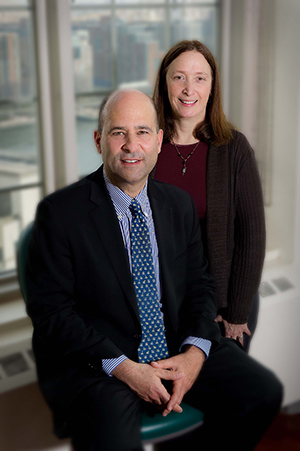Elder Abuse Cannot be Treated in a Silo

Dr. Lachs and Risa Breckman, LCSW
On October 11, 2012, Dr. Lachs testified in Washington, D.C., providing recommendations to the Elder Justice Coordinating Council on HIPPA and IRB issues related to the investigation of elder abuse. As the phenomena of elder abuse traverses many health and social welfare systems, Dr. Lachs explained, "Elder abuse cannot be treated in a silo." He described the challenges faced by elder abuse researchers under HIPPA and IRB guidelines.
In 2009, Dr. Lachs was named Director of the first elder abuse center in the New York area, the NYC Elder Abuse Center (NYCEAC), which was the result of a longtime collaboration between several colleagues at Weill Cornell, Cornell University (Ithaca), and many NYC government organizations and community agencies. Since that time, he has frequently testified in Washington, D.C. as part of his proactive effort to strengthen protection for the elder population of America.
Coinciding with Dr. Lachs' presentation, HHS Secretary Kathleen Sebelius announced that the New York State Office for the Aging received an HSS elder abuse prevention grant. NYCEAC is a key partner on the NYS project. Risa Breckman, LCSW, Deputy Director of NYCEAC states, "Elder justice is fundamentally a human rights issue as freedom from fear and personal safety is at its core. With this funding, we can help restore health and security to victimized older adults and prevent abuse from happening to others."
The New York State Office for the Aging (NYSOFA; Director, Greg Olsen Greg, appointed by Gov Cuomo) will fund two enhanced multidisciplinary teams (E-MDTs), each with a unique feature of a forensic accountant, to investigate and intervene in cases of financial exploitation of older adults. NYSOFA's project partners include NYS Office of Children and Family Services Bureau of Adult Services (OCFS), Weill Cornell Medical Center's New York City Elder Abuse Center (NYCEAC), and Lifespan of Greater Rochester, Inc. (hereafter partners) and will implement in two New York State pilot sites: Manhattan (New York County) and Finger Lakes region (Monroe, Cayuga, Livingston, Ontario, Seneca, Wayne and Yates counties).
The goal is to pilot an intervention that prevents financial exploitation and elder abuse by bringing together entities with resources and skills to form a coordinated E-MDT that will provide improved and effective systems collaboration and specialized responses, resulting in restored safety and security to older adults. The study will focus on frail adults aged 60 and older residing in the pilot sites, showing financial exploitation signs, and who have high risk elder abuse victimization characteristics.
In his recent testimony, Dr. Lachs listed six recommendations to the Elder Justice Coordinating Council which he believes will empower a dedicated, multidisciplinary group of individuals working to protect a vulnerable population:
- Convene an expert panel of ethicists, clinicians, and other community clinicians to explore and address HIPPA and IRB issues surrounding elder abuse; this instead of placing elder abuse under a general rubric of "domestic violence."
- Encourage hospital and physician education about current HIPAA provisions regarding Domestic Violence disclosure, as the law is often interpreted and invoked erroneously to the detriment of victims.
- Encourage research in several areas with a focus on decision-making by protective service workers, while developing methods and techniques for accessing victims and protecting them to the greatest extent possible while permitting their participation in elder abuse research.
- Encourage IRBs be composed of members with research and clinical experience in domestic violence generally and elder abuse specifically.
- Provide guidance to the growing number of elder abuse teams multidisciplinary teams on how they may (a) Serve victims in an interdisciplinary fashion while maintaining HIPAA compliance; (b) Participate in elder abuse intervention research (and refer clients to such research).
- Advocate for a national voice and national leadership in the field at the federal level, so that these and other priorities be effectively implemented. The absence of a unified front in this regard is, ironically, an ageist state of affairs.